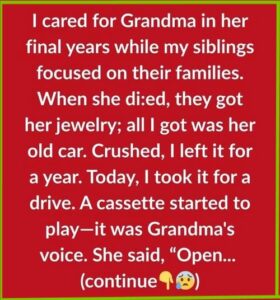I Looked After Grandma While My Siblings Took Everything—Until Her Old Car Revealed the Truth

When my grandmother grew frail, I was the one who stayed. My siblings checked out, busy with their own lives, while I cooked, cleaned, and sat by her side through hospital visits and long, quiet evenings.
When she passed, I expected little, but I still felt the sting of being overlooked. My brother and sister split the jewelry, the heirlooms, the polished mementos of her life. All I was left with was her car—a faded, rattling sedan that groaned more than it ran. It felt like a dismissal. Out of hurt, I pushed it into the garage and forgot about it.
Nearly a year later, I turned the key again. The car sputtered, then came alive, as if shaking off its own grief. That’s when the cassette player clicked. Her voice filled the air—steady, warm, and achingly familiar:
“Sweetheart, open the glovebox. I left something for you.”
My hands trembled as I pulled over. Inside was an envelope with my name on it—Mara, written in her elegant handwriting. No one had spoken that name since she died.
The letter inside was short: “This key unlocks what no one else could ever see. Start with the garden shed. Trust yourself.”
I froze. That shed had been locked for years, dismissed as a pile of junk. But the next day, I drove to her house, heart pounding. My brother owned the property now, but he barely stepped foot there.
The key slid easily into the lock, as though it had been waiting just for me.
Inside, the air was heavy with dust and time. In the corner sat a small wooden chest. Inside were stacks of letters, photo albums, and an old ledger. Another note rested on top: “You always saw me, Mara. Now, I want you to see this.”
The letters weren’t from family. They were from neighbors, women, strangers—people she had quietly helped. Some thanked her for money when no one else would lend it. Others wrote of shelter, safety, or a meal that saved them in a dark hour.
The ledger was filled with names and notes:
“Helped Lorraine with mortgage—Bill doesn’t need to know.”
“Watched Nadia’s kids while she studied—worth the sleepless nights.”
Page after page, my grandmother’s secret kindness spilled out. And at the very end: “For Mara. She gave me laughter, grace, and time. I wish I had more to give back.”
My tears blurred the ink.
At the bottom of the chest was a velvet pouch. Inside was her emerald ring—my grandfather’s gift to her. Sliding it on my finger felt like carrying their love forward.
But her secret wasn’t finished.
Days later, a man named Clyde knocked on my door. He held up an old photo of my grandmother with a boy. “That’s me,” he said softly. “She saved me.”
As a child, he had lived in a violent home. My grandmother gave him food, odd jobs, books—safe spaces to breathe. Now grown, he ran a small business and mentored kids in foster care, carrying forward her gift of seeing people.
Before leaving, he handed me a folded check, written years earlier, with her handwriting scrawled across the note: “From one quiet heart to another.” It was $10,000.
I used it to build something I had always dreamed of: a nonprofit for struggling families and kids who needed a chance. I named it LV & EC—after my grandparents. Volunteers arrived, many of them people she had once helped. It was as though her quiet legacy called them home.
Later, while clearing her attic with Felix, I found an old suitcase with bank records—an account holding over $87,000, left in my name alone. My siblings fumed. I didn’t. Because I knew. This wasn’t about money. It was about trust.
With it, LV & EC grew into a center with tutoring, meals, and a lending library. And one evening, when a mother whispered through tears, “Thank you for seeing me,” I realized—this was her gift. She had passed it on to me.
That cassette in her car wasn’t just a clue. It was her way of reminding me: even after silence, love echoes. And if you listen closely, you can still hear it guiding you forward.